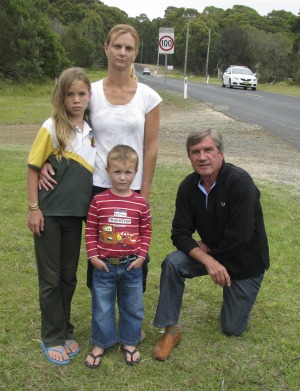By Tim Barlass, November 30, 2014.
It is a remote clifftop enclave boasting seclusion and enviable views.
There is only one blot on the landscape for the 150 or so residents of Potato Point, in Eurobodalla Shire on the south coast – it has become surrounded on three sides by dense bush and, in the event of a bushfire, there is only one road out.
In 1995, part of the area was declared a national park and since then there has been little work to preserve firebreaks, say residents, who have been calling on the National Parks and Wildlife Service to do something since 2003.
A bushfire in 1985 almost reached the village but a 600-metre grass firebreak saved the day, as many scrambled to the beach. The Volunteer Fire Fighters Association says the firebreak no longer exists.
In an advertisement to be published in The Land this week, the association calls on the service to implement what local state member Andrew Constance (NSW Treasurer) and the NSW Minister for the Environment Robert Stokes have already promised the local community and give Potato Point the fire break it needs.
In May, National Parks presented three studies into environmental factors, impact on flora and fauna and an assessment of bushfire risk.
The only animal found to be endangered was the striated fieldwren – and that was the tussocky grassland it favours had been overrun by the trees the NPWS hadn’t thinned.
Residents called in bushfire expert Phil Cheney, whose report said residents of Potato Point were vulnerable to high-intensity bushfire.
He recommended significant fuel reduction, establishment of a substantial firebreak and identification of a safe place for evacuation of the elderly and infirm.
Community representatives met Mr Stokes in August and say a 10-point action plan was agreed by the minister.
Caged in (image above): Lindy Hudson with her children Emily and Tom, and deputy mayor of Eurobodalla Shire Council Rob Pollock.
Deputy mayor of Eurobodalla Rob Pollock said three months on only a watered-down program the National Parks and Wildlife Service had decided on before the meeting with the minister was being implemented.
Mr Pollock told The Sun-Herald: “I think the NPWS is more interested in preserving their bush, which didn’t exist until it was declared a national park. We used to burn it every year and it would be perfectly green grassland again after four weeks.
“If we have another fire I don’t think there’s any doubt there would be loss of houses and I would hope to God that we don’t have personal injury or loss of life.”
But a spokesman for Mr Stokes said a number of outcomes were agreed at a meeting with the community and were being implemented by NPWS and the RFS.
“Not only are the report’s findings being responded to in full, but further fire risk mitigation measures are being carried out following community consultation,” he said.
Tim Shepherd, of the NPWS, said Potato Point was one of the better-protected coastal villages with a bush interface in NSW.
Extensive work carried out provided an effective firebreak, he said.
“We also note that there are divergent views in the community and the comment that the community says there is still not an effective firebreak in place is only one viewpoint,” he said.
Click HERE to view this story on the Sydney Morning Herald web site.



